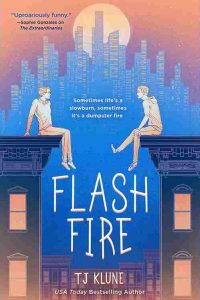Alexandra Pierce Reviews The Man Who Saw Seconds by Alexander Boldizar
 The Man Who Saw Seconds, Alexander Boldizar (Clash 978-1-96098-807-2, $19.95, 325pp, tp) Cover by Joel Amat Güell. May 2024.
The Man Who Saw Seconds, Alexander Boldizar (Clash 978-1-96098-807-2, $19.95, 325pp, tp) Cover by Joel Amat Güell. May 2024.
A precog, an anarchist, and an assistant director of the NSA walk into a bar….
Preble Jefferson can see five seconds into the future. Fish is an anarchist, lawyer, and Jefferson’s friend. Thad Bigman is an assistant director at the NSA. The action in The Man Who Saw Seconds centres on the tension between Jefferson’s care for his family and Bigman’s concern for national security.
Preble Jefferson has been living a quiet life. He makes money from gambling – not as much as he could, but enough to keep his family in comfort; little enough that casinos and governments haven’t asked too many questions. His hobbies are boxing – where his talent is useful – and chess, where it’s less so. He lives with his wife and son, and doesn’t bother the rest of the world. On a late-night train ride home, he makes the mistake of talking back to a police officer. The situation escalates: The police end up shooting one another, because Jefferson can dodge the bullets. In the ensuing police pursuit, 37 officers shoot at, but never hit, Jefferson. The footage of these events catches Bigman’s attention, and he becomes convinced that Jefferson can see the future. Pretty quickly he wonders: What if this man got access to the president of the USA? And then he takes Jefferson’s family hostage. Unsurprisingly, this further escalates the situation, and what started as a suburban altercation between a tired, smart-mouthed man and a police officer becomes one that concerns the highest levels of government in the United States (and elsewhere).
Many authors have grappled with the question of what it would mean to have precognition, and what it means for a narrative: My own introduction to the idea was via Anne McCaffrey; Boldizar compares Jefferson to Laplace’s Demon. Is precognition an ability a character can always access? How far into the future can they see? Can they change the future they see? Boldizar’s genius is in restricting his protagonist to seeing, at most, five seconds into the future. Jefferson can flick through innumerable possible scenarios for those five seconds, but it’s an effort – he must actively look. Boldizar also considers the ethics of precognition. Jefferson can change the future, in that he can take actions to guarantee what happens next; but he is having none of ‘‘with great power comes great responsibility.’’ Nor does he have world-domination fantasies, or even world-changing ones, despite Fish and his anarchist preaching. Jefferson just wants to live a quiet life. His family’s safety, however, is a catalyst: When they are in danger, all other considerations are out the window.
Boldizar accomplishes an enormous amount in this novel. The ethics questions are there: What do you do with the abilities you have? To what extent do you owe your family, or your society, the use of those abilities, and what does society owe you? But Boldizar doesn’t stop there. This is a book that insists that the reader consider questions of authority. Jefferson’s wife, Jane, has been living a comfortable and privileged life, never really being afraid, assuming the social machinery – the police, the law – is there to assist her. Her husband’s experiences and their consequences for her fundamentally shake those assumptions. Thad Bigman’s job is protecting the United States of America: what lengths can, or should, he go to, in doing that? Are the lives of individual American citizens secondary to society as a whole? And what about chains of command, when anyone, including the President, could be compromised? On top of that and in opposition to both Jefferson and Bigman, Fish’s passionate anarchism is also explored sympathetically; indeed, Fish’s beliefs about the place of ‘‘the law’’ and how citizens respond to it – accepting ‘‘the law’’ and thereby granting it legitimacy – are a key part of considering how someone like Jefferson can, or should, (be allowed to) live in society.
The Man Who Saw Seconds is an action thriller that uses an age-old trope – when a man is wronged, his family threatened, how will he respond? – that is genuinely thrilling: the pacing is perfect, and the stakes ratchet up in a horrifying, relentless, and seemingly inevitable progression. Simultaneously, this is a novel that meditates on power and authority, and the ethics thereof. It doesn’t offer simplistic answers; it insists the reader confront the problems presented, and thoughtfully contemplate the solutions presented.
I’ve no doubt there will be some parts of the ‘‘literary’’ establishment who want to keep The Man Who Saw Seconds from being tagged as science fiction, largely because it’s set in the now. But I hope this can be genre-spanning, and that it gets the attention it deserves from every awards list, science fiction and not. I hope that it gets discussed far and wide, and that whenever we talk about how science fiction deals with politics, this is brought into the conversation.
Alexandra Pierce reads, writes, podcasts, cooks and knits; she’s Australian and a feminist. She was a host of the Hugo Award winning podcast Galactic Suburbia for a decade; her new podcast is all about indie bookshops and is called Paper Defiance. Alex has edited two award-winning non-fiction anthologies, Letters to Tiptree and Luminscent Threads: Connections to Octavia E Butler. She reviews a wide range of books at www.randomalex.net.
This review and more like it in the April 2024 issue of Locus.
 While you are here, please take a moment to support Locus with a one-time or recurring donation. We rely on reader donations to keep the magazine and site going, and would like to keep the site paywall free, but WE NEED YOUR FINANCIAL SUPPORT to continue quality coverage of the science fiction and fantasy field.
While you are here, please take a moment to support Locus with a one-time or recurring donation. We rely on reader donations to keep the magazine and site going, and would like to keep the site paywall free, but WE NEED YOUR FINANCIAL SUPPORT to continue quality coverage of the science fiction and fantasy field.
©Locus Magazine. Copyrighted material may not be republished without permission of LSFF.









This several-seconds-precognition thing was the premise of a sci-fi movie I saw on TV in the early 60s.